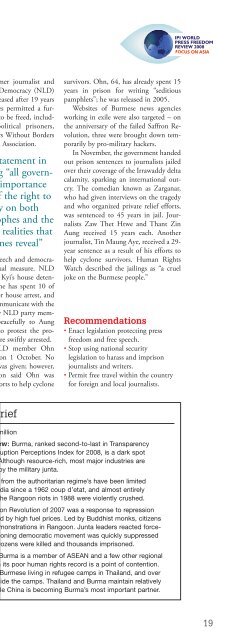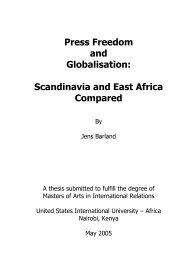FOcus On - International Press Institute
FOcus On - International Press Institute
FOcus On - International Press Institute
You also want an ePaper? Increase the reach of your titles
YUMPU automatically turns print PDFs into web optimized ePapers that Google loves.
adio station. KTR is supposed to be<br />
trans forming into a public broadcaster.<br />
This law effectively strengthens the state’s<br />
grip on the broadcast media.<br />
The investigation into the 2007 murder<br />
of journalist Alisher Saipov was suspended<br />
again this year, after authorities<br />
claimed all leads had turned cold. Saipov,<br />
a 26-year-old ethnic-Uzbek, was editor of<br />
the popular weekly newspaper Siosat –<br />
a highly critical periodical that Uzbek<br />
businessmen often smuggled into neighbouring<br />
Uzbekistan, a country devoid of<br />
independent media. Although the Kyrgyz<br />
authorities promised to track down the<br />
killers, political will soon waned. At the<br />
behest of media NGOs across the world,<br />
the investigation was twice re-opened,<br />
but has as yet yielded no results.<br />
Recommendations<br />
Return broadcasting rights to<br />
independent radio broadcasters.<br />
Resume moves towards the privatisation<br />
of KTR, ensuring that loopholes<br />
do not exist allowing for government<br />
control of editorial content.<br />
Reverse the requirement for RFE/RL<br />
to submit its material for priorapproval<br />
from the government.<br />
Ensure that journalists are left free<br />
to report and investigate without<br />
interference from the state security<br />
services.<br />
Kyrgyzstan in brief<br />
Kyrgyz President Kurmanbek Bakiyev listens<br />
to Russian President Dmitry Medvedev in<br />
Bishkek. (Reuters/RIA Novosti)<br />
Population: 5.4 million<br />
Domestic overview: A landlocked Central Asian country bordering on<br />
China to the East and Kazakhstan, Uzbekistan and Tajikistan to the west,<br />
Kyrgyzstan achieved independence from the Soviet Union in August 1991.<br />
The country was controlled by President Askar Akayev until the so-called<br />
“Tulip Revolution” of 2005, the events of which led to Akayev’s resignation<br />
and the election of Kurmanbek Bakiyev. Sadly, politics have remained<br />
tense in this impoverished nation, with frequent demonstrations calling<br />
for Bakiyev’s resignation for failure to fulfil his promises, and the murder<br />
of several parliamentarians in recent years.<br />
Beyond borders: Despite some border disputes with Tajikistan and Uz -<br />
bekistan, Kyrgyzstan maintains close relations with former soviet countries.<br />
Kyrgyzstan is also home to Manas Air Base, a U.S. military installation<br />
important to Coalition activity in Afghanistan. The country’s principal<br />
exports are nonferrous metals, minerals and agricultural goods to Europe<br />
and Asia, and Kyrgyzstan is a member of the OSCE, the CIS, the Shanghai<br />
Cooperation Organization, the WTO, and the United Nations.<br />
Laos by Nayana Jayarajan<br />
As in previous years, silence and the<br />
lack of information were the main<br />
indicators of the lack of press freedom in<br />
Laos, officially the Lao People’s Demo -<br />
cra tic Republic. The authoritarian, oneparty<br />
state continues to control all media<br />
in the landlocked country, which has<br />
repeatedly been described as having one<br />
of the lowest levels of press freedom in<br />
the world. The ruling communists maintain<br />
strict editorial control over the press,<br />
and the media continue to restrict themselves<br />
to news that is favourable to the<br />
regime.<br />
The ruling Laos People’s Revolution -<br />
ary Party has maintained sole control<br />
over the media since 1975 and, through<br />
its Ministry of Information and Culture,<br />
owns all newspapers and broadcast me -<br />
dia. The state also maintains a monopoly<br />
on newspaper printing rights. Newspaper<br />
circulation figures remain extremely low,<br />
and state-controlled broadcast stations<br />
face heavy competition from channels<br />
broadcasting from Thailand.<br />
The authoritarian,<br />
one-party state continues<br />
to control all media in<br />
the landlocked country<br />
Laos adopted a new Constitution in<br />
1991, which does guarantee the right to<br />
freedom of speech, press and assembly, as<br />
well as the right to set up associations and<br />
to stage demonstrations that are “not<br />
contrary to the laws”. But these rights are<br />
largely acknowledged to be theoretical<br />
only. The penal code establishes strict<br />
penalties for violations of the state’s directives<br />
on the media. Defamation and libel<br />
are criminal offences punishable by incarceration,<br />
as are “propaganda against<br />
the Lao People’s Democratic Republic”<br />
(Article 65), “unlawful production and<br />
possession of radio communication<br />
equipment” (Article 81), and “denigration<br />
of State officials” (Article 159).<br />
The secretive ruling party continues to<br />
exert strong control over the media, even<br />
though central censorship is no longer<br />
practiced. Foreign journalists seeking to<br />
enter Laos must apply for a special visa<br />
and are accompanied by official escorts<br />
throughout their stay. Editors are government<br />
appointees assigned to ensure that<br />
the media functions as a link between the<br />
party and the people. All editors are<br />
39
















